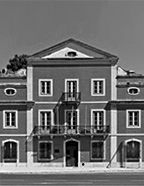

................................
Historiography
I
Following a sudden change of Minister of Education, where Caeiro da Mata was replaced by Fernando Pires de Lima and sent to the Ministry of Foreign Affairs, the new Minister of National Education stood by Alfredo Pimenta. Both Baião and Coelho left the Academic Council. Pimenta, on the other hand, emerged extremely weakened from this conflict. He was never able to participate significantly in the Academy again. He would pass away in 1950. Another aspect of this episode should also be noted: Caetano Beirão, also a founder of the Academy, resigned at one point since he believed that the Academy was acting illegitimately and maliciously against Pimenta. He took a principled stand, but had much less social capital than the renowned polemicist. Whether or not this was his actual desire is unknown, but he was never made an Academic again.
This episode reveals how a confrontational stance was endorsed by the Minister of Education, while the institution routinely backed a concurring stance at the local and day-to-day level. However, with Pimenta's removal from the Academy, and the future return of Laranjo Coelho and António Baião, it was anticipated that in the clash of personae between the more independent and confrontational "man of letters", and the "Academic", more prone to agreement and more dependent on the institution, the APH would increasingly resemble an institution promoting the latter. This case should not be interpreted as anecdotal. While it is relatively extreme on the one hand, the trends it reveals are more nuanced in other episodes on the other. Therefore, it can be interpreted as relatively illustrative of the procedures of the Academy.
Following the election of the Academic Council in 1948, the APH underwent a relative shift in the direction of its work, with Queiroz Veloso, Damião Peres, and Marcelo Caetano, the latter the most dynamic and reformist of the three, joining the Academic Council. Indeed, a series of organisational efforts were immediately noted with the entry of Marcelo Caetano into the Academic Council, that fall into two categories: the production of a more critical and cooperative history, and the commemoration of history in a more visible and effective manner. Even in 1946, before becoming a member of the Council, when he was Minister of the Colonies, Marcelo had invited the Academy to participate in the celebrations of the 5th centennial of the discovery of Guinea, "submitting a record of the works that require new editions and unpublished manuscripts, documents, and geographical charts that should be published. His Excellency wishes that both the new editions and the publication of the unpublished works be undertaken critically, comparing the various copies and annotating them from various perspectives, such as linguistic, historical, geographical, ethnographic, and natural history" (APH, Bulletin 1946, 68).
